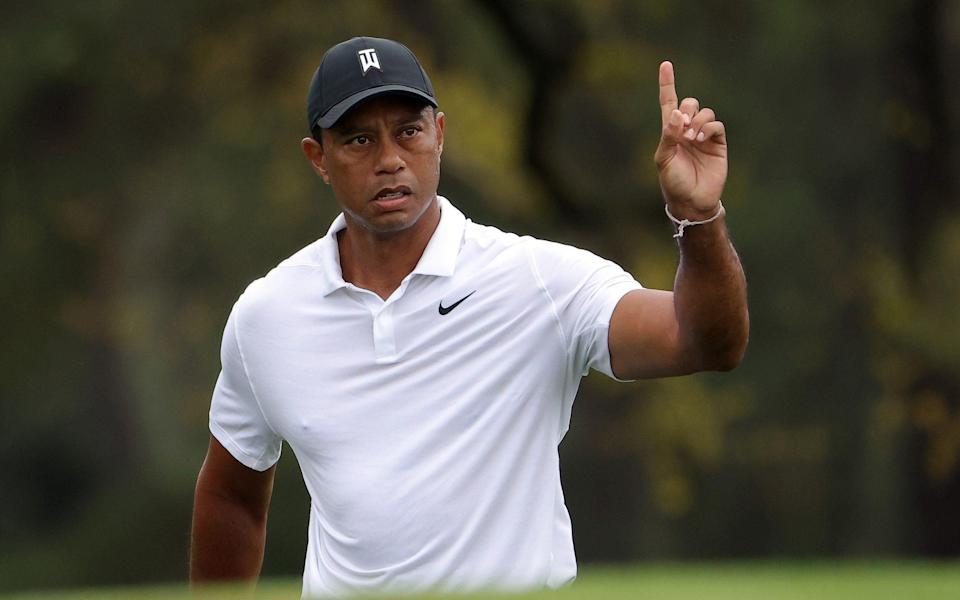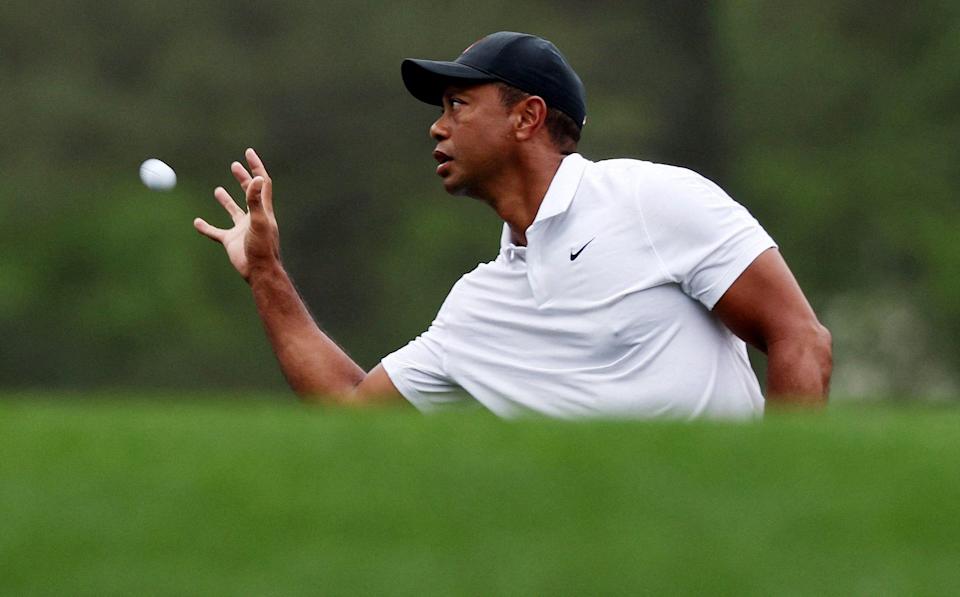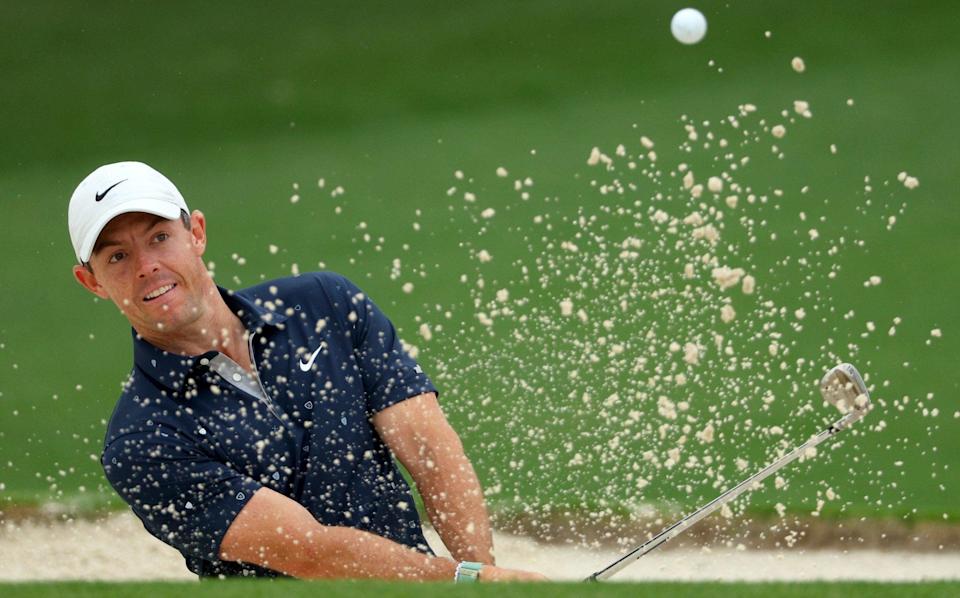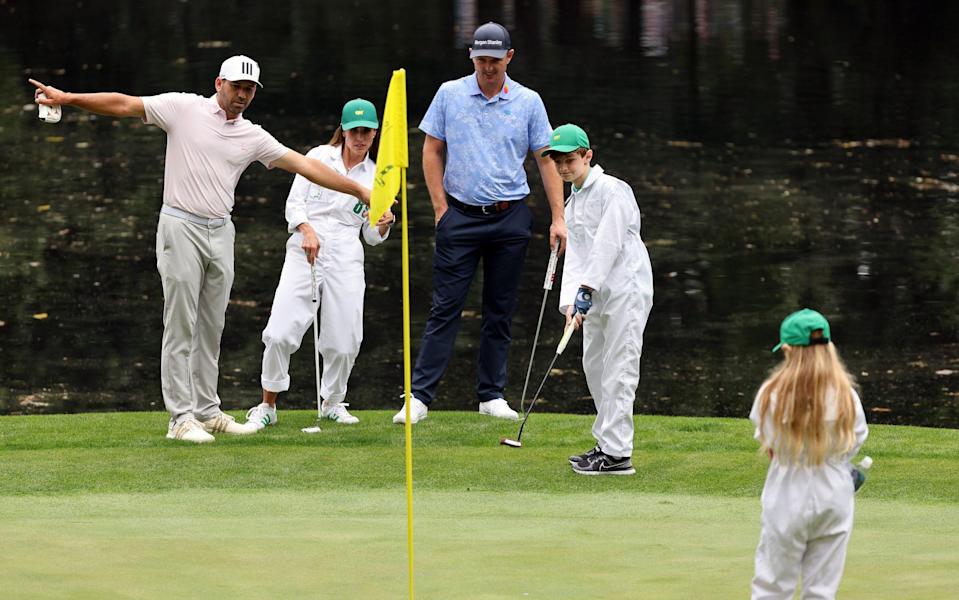
Tiger Woods goes into this first day of the 86th Masters having awarded himself a new nickname: Humpty Dumpty. But only now is it coming to light quite how unlikely this recovery has been.
Telegraph Sport has learned that Woods, 46, encountered “a setback” following his appearance in the PGA Tour’s father-and-child event in late December and the after-effects he suffered convinced his medics that playing here in the season’s opening major was “unthinkable”.
A source said: “He played great with Charlie in Florida [they finished second] but his right leg reacted badly afterwards and that was concerning because Tiger used a buggy in that two-day event. The effects he suffered meant that nobody close to him gave him a prayer of, just a few months later, teeing it up at Augusta.”
This tallies with Woods’s demeanour at the Genesis Open – the Los Angeles tournament that benefits his foundation – in February when he all but discounted his ability to walk 72 holes on this undulating layout. And a month later, Rory McIlroy visited Woods.
“I spent some time with him at his house a few weeks ago and at that point it didn’t seem possible,” McIlroy said last week in Texas. “He has made unbelievable strides since. This is an incredible comeback for a person that we didn’t know would make it through that night.”
“That night”, of course, followed the car crash 14 months ago. If he was lucky to escape that wreckage with his life then his fortune was yet more pronounced when it came to the surgeons rescuing his leg. “Humpty is glued back together and hopefully good enough,” Woods said on Wednesday.
Yet good enough for what? Do we seriously believe that the golfer ranked 994th in the world who has not played competitively for 17 months can win a sixth green jacket?
Realism has been in short supply here these past three practice days – as the capacity crowds have returned after the pandemic limitations and have swarmed back into golf’s fantasyland to worship their superhero – but Paul McGinley was willing to lend at least a measure of sanity.
“Let’s face it, it’s highly unlikely he’s going to win,” the Irishman said. “Even though he’s Tiger Woods, I think top 10 would be an amazing finish. He’s come back from injuries five times in his career, and he’s never come back and hit the ground running with a win on any of those occasions.
“So it must be hugely doubtful that he’s going to come back from the most serious injury and do it. Just to play four rounds and hover around the fringes of the leaderboard would be a fantastic achievement, especially considering the quality he is up against.”




McIlroy believes the strength of opposition is Woods’s fault himself. On the 25th anniversary of his 12-shot win on his professional debut at Augusta, Woods must face the generation who cast themselves in the image of that fearless young champion.
“They are Tiger’s legacy and it all started that week,” McIlroy said. “You see it everywhere in the game; everyone is just so much more professional. Every child with hopes of being a professional golfer wanted to be Tiger Woods after that day. It really is very clear in my memory. The next morning, all I wanted to do was to hit balls and try to be my hero.”
McIlroy still does in a sense. This is his eighth shot at completing the career grand slam, but he is 32 and no longer Tiger’s heir. A new group have picked up the mantle. For the first time in a major since the rankings were inaugurated almost 40 years ago, the top seven in the world are all aged 30 or under. Indeed, in the top 10 only McIlroy and Dustin Johnson are over 30.
World No 1 Scottie Scheffler was 10 months old in April 1997, world No 2 Jon Rahm was two, No 3 Collin Morikawa was two months old, No 4 Viktor Hovland was five months from being born. Granted, unlike McIlroy, none could actually have watched the revolution start, but their dominance was born from the influence.
“He’s done so much for professional golf,” Scheffler said. “The Tour looks a lot different than it did in 1996, so we’re all very grateful. I got paired with Tiger on that Sunday in 2019 when he won his first major in [11 years].
“I watched the way he managed himself around, maybe not even having his best stuff. He didn’t play perfect but, as always, he hit the right shots at the right time. It was pretty special to witness. I learned a lot. We’ve all learned so much from him.”
Like Victor Frankenstein having to square up to his monster, so Woods must bring down his creations. It is a glorious plot, of which, if he were to be honest, only a tiny part is worthy of sober speculation.
Except this is Woods and on Wednesday he provided evidence that startling transformations do come to pass. As he made his final preparations for his first-round date with Louis Oosthuizen and Joaquin Niemann at 10.34am, Woods was being hailed as “an inspiration” by the same green jackets who slaughtered him for “egregious conduct” in the wake of his infamous sex scandal.
Granted, there is a different chairman now to 2010, but Fred Ridley is not so different to Billy Payne. So what has happened for this almost Damascene conversion? In truth, Woods was blessed that on Feb 23, 2021 nobody else in his single vehicle accident was injured or worse.
Another car could easily have been travelling in the other direction when Woods clattered across the central reservation at a speed of 84mph in a 40mph speed zone.
Woods was solely to blame. But here he is being feted by a saint, simply because he encapsulates sport’s adoration of the “never give up” attitude.
“Tiger’s appearance this week is a tribute to his determination and his commitment to excellence as a competitor and as a person,” Ridley said. Prepare for the hyperbole to smash through Amen Corner. It will fall short, however. Nothing else would begin to make sense.
England’s class of 2022 aim to end Masters drought
by Tom Cary
In the quarter of a century since Sir Nick Faldo’s third and final Masters victory in 1996, only Danny Willett has bucked the trend of glorious British failure at Augusta National.
And even Willett would acknowledge he was a little fortunate in that final round in 2016, when Jordan Spieth suffered one of the most memorable Masters meltdowns of recent years.
What has happened to the British challenge at Augusta? And could this be the year the trend is reversed again?
With 11 United Kingdom players in the field – Englishmen Lee Westwood, Matthew Fitzpatrick, Tommy Fleetwood, Paul Casey, Danny Willett, Tyrell Hatton, Justin Rose and the amateur Laird Shepherd, plus Rory McIlroy (Northern Ireland), Robert MacIntyre and Sandy Lyle (both Scotland) – there is certainly no shortage of candidates. But the portents, it has to be said, are not particularly encouraging.
For a start, and for only the second time in the last 15 years, there is no English player currently in the world’s top 10. Of the rest, McIlroy is a perennial favourite of course. But the Northern Irishman has a history of implosions at Augusta (and at majors more generally since 2014) that is starting to look pathological.
MacIntrye looks as if he has the potential to win a Masters, but it is very early to be putting that sort of pressure on the 25-year-old at his second Masters. While 1988 champion Lyle is 64 and has more chance of becoming the Pope than winning again.
Still, there is no reason to be too gloomy. A number of those players are far more dangerous than their rankings would suggest. Rose, for instance, is ranked outside the world’s top 50. But it does not take a huge leap of imagination to see him competing this week, so well does he know Augusta’s manicured fairways and greens.


Rose, who lost out in play-off against Sergio Garcia in 2017, says that the difference is “fractions”.
“The way I look at it is that it wouldn’t have taken any more for me to win the Masters than it did for me to win the Olympic gold medal [in 2016],” Rose said. “There’s always that moment on Sunday afternoon when it happens one way or the other.
“If you look back at the tape in 2017 against Sergio, you would have to say there was a bit of daylight robbery going on. I played plenty good enough down the stretch to win that event and that was the one that got away. In 2015 against Jordan [Spieth], I did the things you’re supposed to do but he just putted his eyeballs out and fair play to him for that.
“I do think that if I’d had the right bit of luck I would be talking to you with a green jacket but then if I’d had the wrong bit of luck in Rio I wouldn’t have become the first golfer in over a century to win an Olympic gold. It’s fractions, at the end of the day.”
Could another Englishman find himself on the right side of those fractions? If so, which one is most likely?
Faldo, a shrewd observer of the game, believes Hatton has what it takes around here, provided the 30 year-old can learn to control his temper.
“He’s a very good ball striker and doing a lot of good things,” Faldo said this week. “But we all know he can lose his head. If he can make sure that losing his head is just for entertainment and doesn’t affect the next shot, then he would be, with his ball striking, keeping himself around.”
One thing is for sure, if the likes of Casey, who finished in a tie for fourth in 2016, or Westwood, who has gone even closer with six top-10 finishes, including two as runner-up, want to get that Masters win, they are going to have to do it soon. Westwood is already 48, two years older than Jack Nicklaus was when he became the oldest Masters champion in history in 1986.
But stranger things have happened. If a 46-year-old Tiger Woods can compete on one leg without having played a competitive round in 17 months, hope surely springs eternal for the rest of the field.
